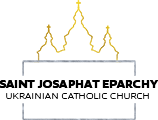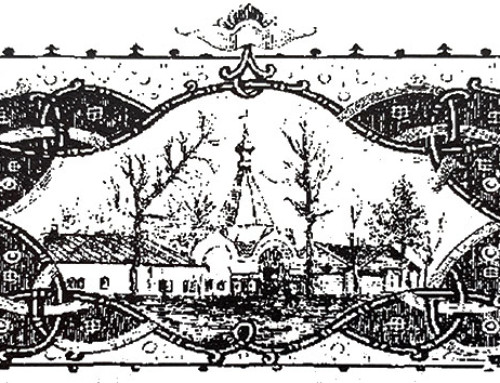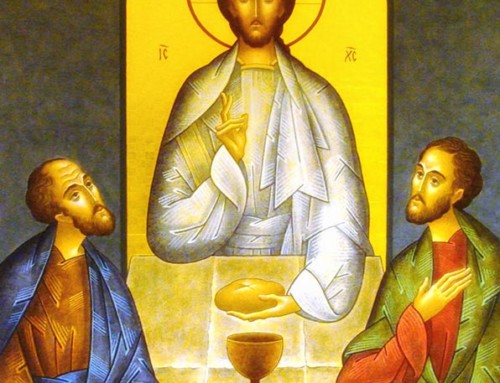The Liturgy of Vespers and the Presanctified Divine Liturgy, Part Two – March 2019
Nevertheless, repentance must begin, even if our steps are weak and stumbling, even when we are not be able to answer these questions perfectly. St. John Chrysostom (+ AD 407) testifies that in his time the next part of Vespers, Psalm 140/141, is prayed daily. He mentions that this psalm (together with Ps. 141 /142, 129 /130, and 116, 117) is not only appropriate for this time of day, since it is an evening hymn (let my prayer rise like incense…the lifting up of my hands like an evening sacrifice), but he also calls it a saving and healing medicine. In the ancient world incense was used to purify and it is consumed or sacrificed upon the burning charcoal. The world is darkness and it is where we both bruise and get bruised. We make the words of these psalms into our own prayer with sincerity while recalling the faults and sins of the day gone by. We are forgiven our sins and healed by this medicinal psalm. Like sugar that helps the medicine go down, we sing the latter verses of this group of so-called Lamp-lighting Psalms, with liturgical poetry that supplies the theme of the day, thus nourishing our often anxious and ignorant minds that they may rest in and follow after our repentant hearts. One modern author writes, “This incense reminds us of the acceptability of our worship to God — through Christ, we now have access to the Father, and He accepts our praises since we offer them to Him as disciples of His Son. The fragrant incense we smell as these psalms and hymns are sung remind us of our exalted status in Christ.”
Our purification and prayers lead us to receive Christ, the Light of the world. The main chandelier in church is lit together with all the lights.
The Pascha/Passover of our Lord from death to Life ever comes through at each Vespers: “The Light shines in the darkness and the darkness has not overcome it” (John 1:5)
He is the true God Who enlightens (i.e., saves) everyone who comes into the world (John 1:9). The light of Christ is salvation, and it is first received as our journey begins in baptism and chrismation (confirmation). Since the Presanctified Divine Liturgy was originally also a time of training people who were preparing for the Holy Mysteries of Initiation, this truth is even more highlighted when the priest declares “The light of Christ enlightens everyone!” In Constantinople, these words were the signal for all the lamps in the church to be lit. Thus, at Vespers we renew our Christian commitment, we profess our desire continue the journey laid out for us by our baptismal promises.
Yes, I choose to give myself permission to engage my life with His life. Yes, I submit to His rescue mission. Yes, I am willing to allow my lifestyle to include and embrace His new reality of my freedom from darkness to the fullest.
Therefore, our Christian ancestors would light a lamp as daylight declined and offer eucharist, that is to say, thanksgiving, to the risen Christ. He is reigning in His Kingdom – ever present, working in and illumining the world.
As believers we respond to the light of Christ, to His work of saving us, by offering ceaseless prayers of thanksgiving to God.
Explaining the Evening Hymn of Thanksgiving (O Tranquilly Joyful Light — Svitlo tykhe), Saint Basil the Great, who was born to eternal life in AD 379, already then called it “ancient”, dating back to the time when the faithful would recite it every evening when the lamp was brought in to provide light for the evening until everyone went to bed. He writes, “Our fathers thought that they should welcome the gift of evening light with something better than silence, so they gave thanks as soon as it appeared. We cannot say who composed these words of thanksgiving at the lighting of the lamps, but the people use these ancient words.” In the church in Jerusalem, the light was brought in, not from the outside (the usual custom), but from the lamp that burned perpetually before the Lord’s Tomb.
As believers we respond to the light of Christ, by joining in the sacrifice of Christ, our God. On Saturdays and feast days, this is done at the Divine Liturgy which is celebrated on the next morning. The Lord speaking through the deacon commands us: “With the fear of God and with faith [and love] approach.” On the weekdays of the Great Fast, we do not delay. The Lord speaking through the deacon invites us: “Come [to receive].” The Eucharist breaks the fast, so that we may go home and eat our main meal of the day.
And thus, in our Lenten journey, the flip side of not celebrating a consecration of offered gifts at a Divine Liturgy is not only the serving of a part of Vespers, but even more importantly, the fulfillment of our need to partake of the most Holy Eucharist in order to sustain and bring about our change of heart in repentance.
This is not only a natural way to end Lenten evening prayer, but it also consciously carries to heart the message that my journey of repentance, whether during the Great Fast or during my entire life on earth, – my ability to answer the above Big Question in a positive and healthy and lifegiving way – is something that I cannot ever accomplish on my own strength.
I need the Lord’s most intimate presence, in His Eucharist, that my repentance – my change of heart – may come into existence, take root and bear fruit.
We will continue reflecting upon the meaning of Presanctified and/or Vespers in the April 2019 installment, but in the meantime if your parish has already restored the Divine Worship Services of the Presanctified and/or Vespers, then the Church encourages you to attend. You can also learn how to pray Vespers at home. It is a beautiful, peaceful service that will help you to be a better Christian and prepare you, so that your Life in Christ will be more holy and rewarding. Many of us are busy, indeed, and when the temptation for us busy people to reduce our church-going only to the Divine Liturgy (either on Saturday evenings or Sunday mornings) presents itself, we easily fall for it. Let us fight this temptation by not under-appreciating Vespers or the Presanctified. Even though “the ruler of this world” wants us to do so, let us not fall into his trap of considering services other than the Divine Liturgy as relatively unimportant, simply because we are busy.
Літургія Вечірні й Передосвячених Дарів, Частина Друга – березень 2019
Все ж таки, покаяння мусить розпочатися, навіть якщо наші кроки слабкі і спотикаються, навіть якщо ми не зможемо досконало відповісти на ці питання. Св. Іван Золотоустий (+ 407 р.Б.) свідчить, що в його часах в наступній частині Вечірної Літургіі, молилися словами 140/141 Псалма. Він згадує, що цей псалом (разом з Пс. 141/142, 129/130 і 116, 117) не тільки підходить цьому часі дня, оскільки це вечірня пісня (нехай направиться молитва моя перед Тобою, наче кадило … підношення рук моїх, як жертва вечірня), але він також називає цю молитву спасаючою і лікувальною медициною. У стародавньому світі ладан використовувався для очищення повітря, і його приносили, тобто жертвували, на палаючому вугіллі. Світ – це темрява і саме в цьому середовищі ми або завдаємо або одержуємо рани гріховні. Ми щиросердечно присвоюємо слова цих псалмів перетворюючи їх в нашу особисту молитву, згадуючи наші помилки і гріхи з минулого дня. Нам прощаються наші гріхи і так ми зціляємося цим лікувальним псалом. Подібно до солодкого цукру, який допомагає гіркій медицині спускатися, ми співаємо останні вірші цієї групи так званих “світильничніх псалмів”, додаючи літургійну поезією, котра охоплює тему дня, тим самим живлячи наші часто затривожені і неосвічені уми, щоб вони відпочили і слідували за нашими розкаяними серцями. Один сучасний автор пише: “Цей ладан нагадує нам що наше богопочитання подобається Богові – через Христа, ми тепер маємо доступ до Отця, і Він приймає наші похвали, оскільки ми приносимо їх Йому, як ученики Його Сина. Запах ароматного кадила при тому як ми співаємо ці псалми і пісні, підтверджує нам нашy піднесену й возвеличену гідність у Христі.”
Наше очищення і молитви спонукають нас прийняти Христа, Світло світу. Головнe панікадило в церкві освітлюється разом з усіма світлами й свічками.
Пасха / Перехід нашого Господа від смерті до Життя променіє на кожній Вечірній Літургії: “Світло світить у темряві, і темрява його не пойняла” (Іван 1:5)
Він є істинним Богом, який просвічує (тобто р’ятує, спасає) кожного, хто приходить у світ (Івана 1:9). Світло Христа – це спасіння, і воно вперше приймається, тоді коли наша подорож починається у святому хрещенні і миропомазанні. Оскільки Божественна Літургія Передосвячених Дарів спочатку була також часом вишколення людей, які готувалися прийняти Святі Таїнства Втаємничення, ця правда ще більше підкреслюється, коли священик заявляє: “Світло Христове просвіщає всіх!” На літургії в Царгороді це було знаком щоб засвітили всі світильники в храмі. Таким чином, на Вечірній ми відновлюємо своє християнське зобов’язання, ісповідуємо своє бажання слідувати дорогою визначеною нам нашими обітами хрещення.
Так, я вирішив дати собі дозвіл щоб моє життя перепліталося з Його життям. Так, я бажаю підкоритися Йому в Його місії мене спасти. Так, я готовий дозволити своєму способу життя включити Його нову реальність життя у свободі від темряви!
Тому наші християнські предки запалювали б світильники, коли денне світло знижувалося і приносили жертву євхаристії, тобто, благого дару вдячності-подяки, воскреслому Христу. Він царює у своєму Царстві – присутній, діючий і просвічуючий у цьому світі.
Як віруючі, ми реагуємо на світло Христа, на Його спасаючу діяльність, жертвуючи Йому безперервну молитву подяки Богові.
Пояснюючи Вечірню Пісню Благодарення (Світе Тихий – Світло Тихе), св. Василій Великий, який народився у вічне життя 379 р.Б., вже тоді назвав її “древною” що походить з тих часів коли кожного вечора вносили лампаду щоб забезпечити світло на вечір, поки всі не лягли спати. Він пише: “Наші отці вважали, що вони повинні привітати дар вечірнього світла з чимось кращим, ніж звичайною тишиною, отже вони співали пісню подяки, як тільки воно появлялося. Ми не можемо сказати, хто склав ці слова подяки при запалюванні ламп, але люди використовують ці древні слова.” Звичайно світло вносили ззовні, але в церкві в Єрусалимі світло брали від того вогню, що постійно горіло перед Господнім гробом.
Як віруючі ми реагуємо на світло Христове, приєднуючись до жертви Христа, Бога нашого. По суботах і святах це робиться на Божественній Літургії, яка служиться наступного ранку. Господь, промовляючи через диякона, наказує нам: “Зі страхом Божим і вірою [і любов’ю] приступіть”. У будні Великого Посту ми не затримуємося аж до ранку але вже того вечора Господь, промовляючи через диякона, запрошує нас: “Приступіте!”
І, таким чином, серед нашої великопосної подорожі, зворотний бік того що ми не святкуємо освячення дарів приношених в жертву на Божественній Літургії – це не тільки те що ми служимо частину Вечірної Літургії, але, що ще важливіше, переживаємо сповнення нашої необхідності запричащатися найсвятішої Євхаристії щоб підтримати і завершити зміну серця нашим покаянням.
Це не тільки природний спосіб закінчити вечірню молитву, але й свідомо несе в собі досердечну думку про те, що моя подорож покаяння, – чи то під час Великого Посту, чи протягом всього мого життя на землі, – й моя здатність відповісти на вищевказане Велике Питання в позитивному і здоровому і життєдайному шляху – це щось, що я ніколи не можу досягти своїми власними силами.
Мені потрібна найбільш інтимна присутність Господа, в Його Євхаристії, щоб моє покаяння – моя зміна серця – могли виникнути, вкоренитися і принести плоди.
Ми будемо продовжувати роздумувати над значінням Літургії Прередосвячених Дарів і/або Вечірної Літургії в квітневій частині 2019 року, але якщо вміжчасі у вашій парафії вже відновлено служити Літургію Передосвячених Дарів і/або Вечірню Літургію, тоді Церква заохочує вас до участі. Можна також вивчити як молитися Вечірнею вдома. Це прекрасна, спокійна служба, яка допоможе вам ставати кращим християнином і підготувати нас, щоб наше життя у Христі було більш святим і корисним. Багато хто з нас зайняті, і коли приходить спокуса для нас зайнятих обмежувати нашу присутність в церкві лише до Божественної Літургії (чи то в суботні вечори, чи в недільні ранки), ми легко потрапляємо на таке мислення. Нам потрібно боротися з такою спокусою, недоцінювати Літургію Передосвячених Дарів і/або Вечірню Літургію. Незважаючи на те, що “правитель цього світу” хоче, щоб ми так робили, не впадаймо в його пастку, думаючи що всі Богослужіння поза Божественною Літургією є відносно неважливі, просто тому, що ми зайняті.


